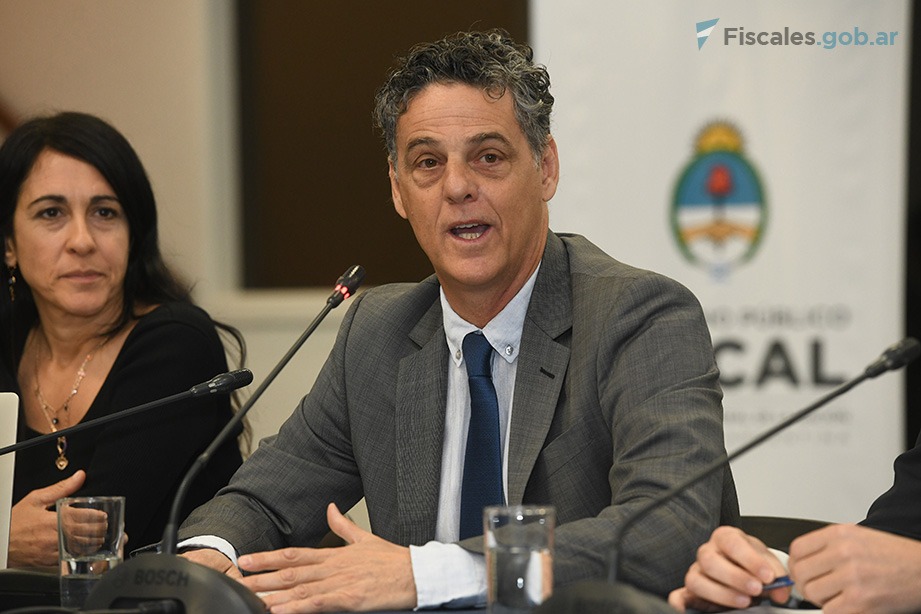Marcelo Colombo is co-head of Argentina’s Prosecutor’s Office for Trafficking and Exploitation of Persons (PROTEX) and coordinator of AIAMP’s Human Trafficking and Migrant Smuggling Network. He has been working for years with the cooperation of the European Union weaving networks to address violence against women. She is currently collaborating with the COPOLAD III Program in an initiative to incorporate the gender dimension in the relationship between drug trafficking and human trafficking, and to strengthen the capacities of the Public Prosecutor’s Offices for a comprehensive approach. “Initiatives such as this are an excellent example of how coordination between specialized international networks opens the way to improve the practices and knowledge of the Administration of Justice”.
What are the main problems of violence faced by women in Latin America and the Caribbean?
Women are confronted with problems of significant magnitude. The differentiated affectation suffered by women is alarmingly manifested in the high rates of various crimes, including human trafficking, with a particular focus on sexual exploitation. A clear example of this reality is Argentina, where 78% of the victims in convictions for trafficking are women, reaching 98.7% in cases of sexual exploitation.
Recently, considerable growth has been observed in situations where elements converge involving women victims of trafficking, who end up being an integral part of the fungible activities of large criminal organizations, as in the case of drug trafficking. The latter sector takes advantage of women in extremely vulnerable conditions for the commercialization and transport of illicit substances. It is in this context that the interconnection of the social problem of violence against women with the development of criminal activities is recognized, underscoring the need to address these issues in a coordinated and urgent manner.
How can the public administration provide solutions to these problems? What is the role of the prosecutors’ offices?
In the judicial sphere, it involves ensuring that cases of violence against women are addressed in a comprehensive manner, adequately considering the gender dimensions at all stages of the legal process. It is essential to ensure the effective protection of victims throughout the entire procedure. Rrecognizing the difficulties they face in giving testimony and ensuring their comprehensive physical and psychological well-being.
The strengthening of these actions is significantly enhanced through active participation in discussion spaces, such as inter-network working groups. Including that representatives of civil society, academia and the private sector, contributes to enriching the panorama and generating more complete and sustainable solutions.
Achieving a high-standard state response in justice and public administration requires a comprehensive commitment to the gender perspective, from policy formulation to implementation and evaluation. Efficient coordination between the different actors involved and active participation in spaces for dialogue are fundamental elements in advancing towards a more just and egalitarian society.
What new strategies can be applied in relation to the criminal treatment of trafficked women involved in drug trafficking?
In the area of criminal treatment of women victims of trafficking linked to drug trafficking, it is vitally important to apply a human rights and gender approach to policymaking. This implies recognizing and addressing the structural inequalities that can lead these women to situations of vulnerability, thus ensuring a legal response in accordance with the fundamental principles of equity and justice.
The incorporation of the principle of non-punishability in policy-making and criminal treatment reflects a commitment to human rights and a deeper understanding of the complexities faced by trafficked women, thus strengthening the search for equitable justice that is sensitive to the particularities of each case. Another possibility is to establish rebuttable presumptions that prevent the prosecution of women who have been used as human couriers and ingested with narcotic substances for small-scale drug transportation. Based on the presumption that if she has lent herself to a life-threatening activity she has done so from a highly disadvantaged state of affairs where the “freedom” of choice presents challenges that a justice system respectful of equitable treatment cannot ignore. This innovative strategy seeks to provide a legal framework that is fairer and more aligned with the principles of protection of potential victims.
Strengthening international cooperation in the prosecution of cases related to trafficking and drug trafficking is another crucial aspect. This implies the harmonization of laws and protocols, as well as the efficient exchange of information between countries, ensuring a joint and coordinated response to these complex problems. Initiatives such as the one carried out by the COPOLAD Project and the Ibero-American Association of Public Prosecutors (AIAMP) are an excellent example of how coordination between specialized international networks opens the way to improve the practices and knowledge of justice administrators. Through this proposal, the aim is to establish shared criteria for action that will result in practical tools for prosecutors and other justice system professionals with a holistic and intersectional gender perspective.






